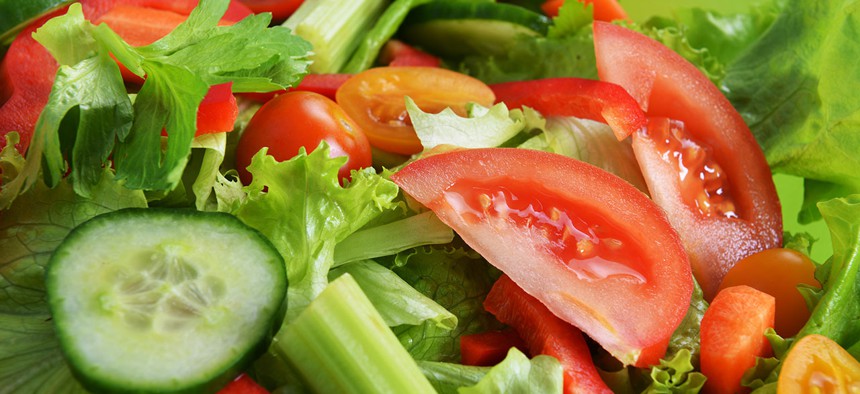
Americans may not recognize this, but it's an actual salad. Denis Tabler/Shutterstock.com
CDC Study: A Very Low Number of Americans Eat Enough Fruit and Vegetables
No, the CDC says French fries and pizza don't count.
Raise your hand if you ate a vegetable today. Keep it raised if you ate several. If you’re American, chances are, your hands are down.
Only 13% of adult Americans ate the recommended 1.5-2 cups of fruit each day in 2013, and fewer than 9% ate the recommended 2-3 cups of vegetables. That’s the result of a new survey by the Centers for Disease Control and Prevention (CDC), which analyzed responses from 373,580 adults across all 50 US states.
“It’s not that hard,” one of the study’s coauthors, Latetia Moore, told Quartz. “A banana and half or a medium sized apple is one and a half cups of fruit.”
The results varied across the country, but they were discouraging in all states. The lowest vegetable intakes were in Mississippi (only 5.5% of those surveyed) and Oklahoma (5.8%). Even in California, the most salad-loving state, only 17.7% were getting enough fruit and 13% were meeting their vegetable requirements.
The CDC used survey data from the Behavioral Risk Factor Surveillance System (BRFSS), which runs an ongoing state-based telephone survey. It asks about consumption of fruit juice (but only the 100% juice kind), whole fruits, beans and a variety of vegetables over the past month. And no, since you asked: For this purpose, French fries and their other fried potato brethren aren’t “vegetables.”
The report paints a worrying picture when the number of obese—as opposed to merely overweight—Americans is sharply on the rise . And it coincides with a new decline in home cooking. In 1965, middle-income Americans ate 92% of their meals at home. In 2008 they ate only 69%. That proportion rose slightly after the financial crisis, but has started falling again in the last two years.
The BRFSS doesn’t survey people in prison, the military, nursing homes or long-term care, but the study’s authors say it’s unclear what including them would do to the results. However, they do note another limitation in the data: Self-reporting is notoriously unreliable and often overestimates intake. So people are probably eating even fewer vegetables than the report says.
Bottom line: however much salad you think you’re eating, it probably isn’t enough.
( Image via Denis Tabler / Shutterstock.com )






